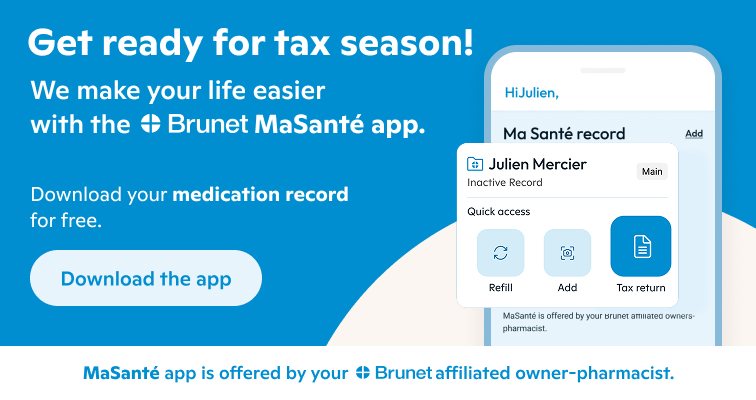Did you know that a minor cut or contact with a rusty object can expose you to tetanus? Fortunately, your pharmacist can now administer the tetanus vaccine directly at their pharmacy. They’re also ready to provide all the advice you need to protect yourself against this infection.
In this article, you’ll learn how to prevent tetanus—and learn to recognize the first signs so you can act quickly.
Get your free tetanus vaccine at a Brunet pharmacy near you. Visit our tetanus vaccine webpage to book an appointment and learn more about the service.

Understanding tetanus: definition, prevention, symptoms, and incubation
What is tetanus?
Tetanus is a serious infection caused by Clostridium tetani, a bacterium found in soil, dust, and animal feces. When it enters the body through a wound, it can produce a powerful neurotoxin called tetanospasmin.
Tetanospasmin acts directly on the central nervous system, disrupting the normal communication between nerves and muscles. For example, it blocks the inhibitory signals that allow muscles to relax, resulting in involuntary, painful muscle spasms and muscle rigidity. These spasms can become so severe that they can cause breathing difficulties and seizures.
How is tetanus contracted?
Tetanus is not contagious; that is, it doesn’t spread from one person to another. The infection develops when spores of the Clostridium tetani bacterium, which is present in the environment, enters the body through a wound.
Even a small wound can become a gateway for tetanus if it comes into contact with contaminated soil or objects. Here are a few ways it can be contracted:
- Deep or perforating wounds
- Cuts contaminated by soil or feces
- Severe burns or frostbite
- Animal bites or scratches
- Injuries caused by contaminated objects, whether rusty or not
Once in the body, in an oxygen-poor environment such as a closed wound, the spores can transform into active bacteria that release tetanospasmin, leading to tetanus symptoms.
What are the symptoms of tetanus?
Symptoms of tetanus appear gradually and include:
- Jaw muscle rigidity (trismus)
- Painful muscle spasms
- Difficulty swallowing
- Fever
- Changes in blood pressure
These symptoms generally worsen in the presence of stimuli such as noise or touch, triggering intense, painful muscle contractions.
What are the possible complications of tetanus?
If not promptly treated, tetanus can lead to serious complications requiring urgent hospitalization, including respiratory aid and specialized intensive care. Possible complications include:
- Respiratory distress
- Pneumonia
- Nerve damage
- Convulsions
In the most serious cases, tetanus can be fatal.
How is tetanus treated?
Tetanus requires urgent treatment in a hospital, and generally involves:
- Administration of tetanus immune globulin (targeted antibodies)
- Antibiotic therapy to eradicate the bacteria
- Wound cleansing and debridement
- Intensive care, sometimes requiring respiratory aids and muscle relaxants (myorelaxants).
What is the incubation period for tetanus?
The time between infection and the appearance of the first tetanus symptoms is usually between 3 and 21 days, but is about 8 days on average.
The shorter the incubation period, the more serious the prognosis, especially if symptoms appear within less than 7 days.
Who is at greatest risk of contracting tetanus?
Certain populations are at higher risk of developing tetanus:
- People who haven’t been vaccinated or who are not up-to-date on their booster doses
- Children living in areas with low vaccination rates
- People who have been wounded by a contaminated object (metal, wood, etc.) or have a wound that’s come into contact with contaminated soil
- Seniors (65+), as their immunity levels decline more quickly than others.
How can tetanus be prevented?
Tetanus can be prevented by following a few simple but essential steps to reduce the risk of infection, especially after an injury.
- Follow the provincial vaccination schedule, right from infancy (website in French only).
- Get a tetanus booster shot every 10 years throughout adulthood, or sooner in the case of a high-risk injury.
- Clean all wounds thoroughly, even superficial ones, with soap and water.
- Consult a pharmacist or health care professional if you have a deep cut or contaminated wound.
- Go to the hospital for rapid intervention, especially if you have a serious injury or your overall health seems to be deteriorating.
Vaccination from infancy is still the best way to prevent this serious infection.
Tetanus vaccine: everything you need to know
Can I get a tetanus vaccine at my local pharmacy?
You can! As of 2022, pharmacists have been able to prescribe and administer the tetanus vaccine in the pharmacy, without the need for a doctor’s visit. Simply book an appointment with your pharmacist online, by phone, or in person.
Availability and the minimum age for vaccination may vary from one Brunet pharmacy to another.
Where else can I get a tetanus vaccine?
In addition to pharmacies, the tetanus vaccine is also available at some doctors’ clinics and in vaccination centres.
When should I get vaccinated against tetanus?
The first tetanus shot is administered in early childhood, as part of the regular immunization schedule. Children and teens receive several doses to establish long-term protection against infection. This early immunization is essential, as young children are particularly vulnerable to infection if they aren’t vaccinated according to the schedule.
How long does the tetanus vaccine last?
Tetanus vaccine efficacy is very high—close to 100 percent—as long as you receive the recommended booster doses on time.
In adults, protection against tetanus lasts an average of 20 years up to the age of 65. After 65, immunity tends to decline more rapidly, so it’s important to get a booster dose every 10 years. It also takes a few weeks for the protection to become fully effective.
When should I get my booster shot?
The tetanus vaccination schedule is as follows:
- First shots during childhood
- A booster shot in adolescence
- A booster shot every 10 years, or at age 50
- A booster shot every 10 years from age 65
If you have a high-risk injury and your last vaccination was more than 5 years ago, an additional booster shot may be recommended. This is why it’s important to keep your vaccination record up to date. If you aren’t sure when you were last vaccinated, talk to your pharmacist about it.
Why is immunization still the best form of protection?
The tetanus vaccine remains the simplest, safest, and most effective way to prevent this bacterial infection.
Not only does immunization protect each individual, it also helps reduce the circulation of Clostridium tetani bacteria in the environment. Maintaining a high level of vaccination coverage helps limit cases of tetanus, avoid serious hospitalizations, and protect the most vulnerable.
Make an appointment at a pharmacy for your vaccine without a doctor’s prescription
Get your tetanus vaccine directly from your pharmacy. It’s fast, easy, and free!
Last updated on July 10, 2025
Other artiles that may interest you

